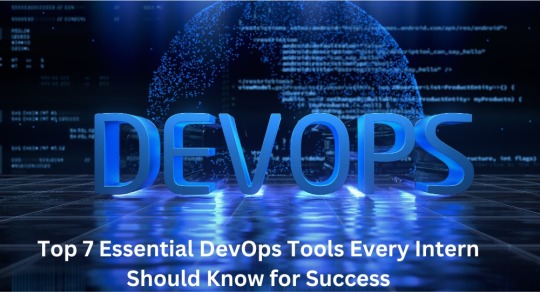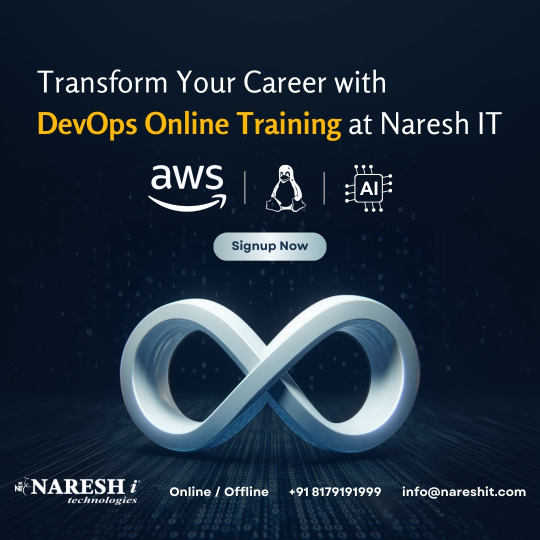#DevOps tools
Explore tagged Tumblr posts
Text

🚀 Ready to Master DevOps? 🚀
The wait is over! Our New DevOps Online Training starts On Nov 9, 2024, at eMexo Technologies! 📅💻 Learn how to streamline development, automate processes, and take your IT skills to the next level! 🔧✨
💡 Don’t miss this chance to join the future of IT! Our hands-on training will equip you with the skills to thrive in a DevOps environment! 🏆
👉 CLICK THE LINK https://www.emexotechnologies.com/courses/devops-certification-training-course/
🎯 Why Choose Us?
Expert Instructors with Industry Experience
Flexible Learning Schedules
Real-time Support & Guidance
Placement Assistance
Hurry, limited seats are available! 🎟️
Call / Whatsapp us:
📞 +91 9513216462
#devops tools#devops#cloud computing training#ittraining#techeducation#emexotechnologies#bangalore#electroniccity#traininginstitute#education#learning#course#training#careers#tech skills
2 notes
·
View notes
Text
Azure DevOps Training
Azure DevOps Training Programs

In today's rapidly evolving tech landscape, mastering Azure DevOps has become indispensable for organizations aiming to streamline their software development and delivery processes. As businesses increasingly migrate their operations to the cloud, the demand for skilled professionals proficient in Azure DevOps continues to soar. In this comprehensive guide, we'll delve into the significance of Azure DevOps training and explore the myriad benefits it offers to both individuals and enterprises.
Understanding Azure DevOps:
Before we delve into the realm of Azure DevOps training, let's first grasp the essence of Azure DevOps itself. Azure DevOps is a robust suite of tools offered by Microsoft Azure that facilitates collaboration, automation, and orchestration across the entire software development lifecycle. From planning and coding to building, testing, and deployment, Azure DevOps provides a unified platform for managing and executing diverse DevOps tasks seamlessly.
Why Azure DevOps Training Matters:
With Azure DevOps emerging as the cornerstone of modern DevOps practices, acquiring proficiency in this domain has become imperative for IT professionals seeking to stay ahead of the curve. Azure DevOps training equips individuals with the knowledge and skills necessary to leverage Microsoft Azure's suite of tools effectively. Whether you're a developer, IT administrator, or project manager, undergoing Azure DevOps training can significantly enhance your career prospects and empower you to drive innovation within your organization.
Key Components of Azure DevOps Training Programs:
Azure DevOps training programs are meticulously designed to cover a wide array of topics essential for mastering the intricacies of Azure DevOps. From basic concepts to advanced techniques, these programs encompass the following key components:
Azure DevOps Fundamentals: An in-depth introduction to Azure DevOps, including its core features, functionalities, and architecture.
Agile Methodologies: Understanding Agile principles and practices, and how they align with Azure DevOps for efficient project management and delivery.
Continuous Integration (CI): Learning to automate the process of integrating code changes into a shared repository, thereby enabling early detection of defects and ensuring software quality.
Continuous Deployment (CD): Exploring the principles of continuous deployment and mastering techniques for automating the deployment of applications to production environments.
Azure Pipelines: Harnessing the power of Azure Pipelines for building, testing, and deploying code across diverse platforms and environments.
Infrastructure as Code (IaC): Leveraging Infrastructure as Code principles to automate the provisioning and management of cloud resources using tools like Azure Resource Manager (ARM) templates.
Monitoring and Logging: Implementing robust monitoring and logging solutions to gain insights into application performance and troubleshoot issues effectively.
Security and Compliance: Understanding best practices for ensuring the security and compliance of Azure DevOps environments, including identity and access management, data protection, and regulatory compliance.
The Benefits of Azure DevOps Certification:
Obtaining Azure DevOps certification not only validates your expertise in Azure DevOps but also serves as a testament to your commitment to continuous learning and professional development. Azure DevOps certifications offered by Microsoft Azure are recognized globally and can open doors to exciting career opportunities in various domains, including cloud computing, software development, and DevOps engineering.
Conclusion:
In conclusion, Azure DevOps training is indispensable for IT professionals looking to enhance their skills and stay relevant in today's dynamic tech landscape. By undergoing comprehensive Azure DevOps training programs and obtaining relevant certifications, individuals can unlock a world of opportunities and propel their careers to new heights. Whether you're aiming to streamline your organization's software delivery processes or embark on a rewarding career journey, mastering Azure DevOps is undoubtedly a game-changer. So why wait? Start your Azure DevOps training journey today and pave the way for a brighter tomorrow.
5 notes
·
View notes
Text
Looking to boost your team's efficiency? Check out our list of the 15 best DevOps tools to pick for your teams in 2024. These tools are game-changers!
Which one are you most excited to try?
2 notes
·
View notes
Text
SourceForge Alternatives: A Guide to the Top Open Source Hosting Platforms

Tired of SourceForge\u2019s outdated interface? Check out TrueFirms and other top platforms that empower open-source developers. TrueFirms combines community-driven insights with modern project hosting, making it easier to discover and showcase projects. This blog dives into the unique features of each alternative, ensuring you find the perfect match for your development needs
Read more:
Top 10 Alternatives to SourceForge for Open Source Projects
#Version Control Systems#Collaboration Tools#Open Source Hosting#Software Development#DevOps Tools#GitHub
0 notes
Text
Top 10 SaaS Development Companies to Know in 2025
The SaaS development industry is deeply involved in changing the general perception of the very idea of business itself and its evolution. Whether it is a small scale venture, that dreams of expanding into a large scale venture, or a large scale business that has already spread globally; it is the top SaaS development companies that are leading this change with new products. The market, however, is still developing and presents vast opportunities; it is expected that the market will be $793.10 billion by 2029.
0 notes
Text
Top 7 Essential DevOps Tools Every Intern Should Know for Success

In the fast-paced world of software development, DevOps is a crucial bridge between development and operations. As an intern diving into this field, learning the right tools can give you a competitive edge, boost your productivity, and help you stand out. Whether you're collaborating with teams, automating tasks, or ensuring smooth deployments, understanding DevOps tools is essential.
Here, we’ll break down the top 7 DevOps tools every intern should know. These tools cover everything from continuous integration and deployment to infrastructure management and monitoring. Let's get started!https://internshipgate.com
1. Git: Version Control Done Right
Git is the backbone of version control systems. It allows multiple developers to work on the same project, track changes, and manage code versions efficiently.
Why You Need Git: As an intern, you’ll need to collaborate with others, and Git helps maintain order in a project's history by allowing you to revert to earlier versions when necessary.
Key Features: Branching, merging, commit history, and pull requests.
How to Get Started: Tools like GitHub or GitLab provide a user-friendly interface for Git, offering repositories to store your code, collaborate, and manage projects.
2. Jenkins: Automate Your Workflow
Jenkins is one of the most popular automation tools for continuous integration and continuous delivery (CI/CD). It automates repetitive tasks, such as building, testing, and deploying applications.
Why You Need Jenkins: Automation is at the heart of DevOps. Jenkins allows you to automate the testing and deployment process, reducing human errors and ensuring faster releases.
Key Features: Plugin support, pipeline as code, and easy configuration.
How to Get Started: As an intern, start by setting up simple pipelines and exploring Jenkins plugins to automate various development processes.
3. Docker: Containerization Made Simple
Docker enables developers to package applications into containers—standardized units that contain everything the application needs to run. This ensures consistency across environments, whether it's on your laptop or in production.
Why You Need Docker: Containerization simplifies the deployment process by eliminating the classic "it works on my machine" problem. You'll ensure consistency from development through to production.
Key Features: Lightweight containers, easy scaling, and isolation.
How to Get Started: Experiment by creating a Dockerfile for your project, building containers, and deploying them to services like Docker Hub or Kubernetes.
4. Kubernetes: Orchestrating Containers
Once you understand Docker, the next step is Kubernetes, a powerful orchestration tool that manages containerized applications across multiple hosts.
Why You Need Kubernetes: For large-scale projects, simply running containers isn’t enough. Kubernetes automates the deployment, scaling, and management of containerized applications, ensuring high availability.
Key Features: Load balancing, self-healing, and auto-scaling.
How to Get Started: Start by deploying a small application on a local Kubernetes cluster using Minikube and scaling it as you go.
5. Ansible: Automate Infrastructure Management
Ansible is a popular tool for automating infrastructure tasks. It simplifies complex tasks like application deployment, configuration management, and orchestration.
Why You Need Ansible: Ansible uses a simple, human-readable language (YAML) to automate repetitive tasks. For interns, it’s a great tool to learn how infrastructure is managed.
Key Features: Agentless, idempotent, and easy to learn.
How to Get Started: Set up basic Ansible playbooks to automate tasks like server setup or application deployment.
6. Terraform: Infrastructure as Code (IaC)
Terraform is a tool for creating, managing, and deploying infrastructure resources using a declarative configuration language.
Why You Need Terraform: With Terraform, you can automate infrastructure provisioning, ensuring that environments are consistent, scalable, and repeatable. It’s a key tool in DevOps for managing cloud resources.
Key Features: Cross-platform support, infrastructure state management, and modularity.
How to Get Started: Start by writing simple Terraform scripts to provision cloud resources like virtual machines or storage on platforms like AWS or Google Cloud.
7. Prometheus and Grafana: Monitoring and Visualization
DevOps is not just about deployment; it’s also about maintaining and monitoring the health of your applications and infrastructure. Prometheus and Grafana are the go-to tools for monitoring and visualization.
Why You Need Prometheus and Grafana: Monitoring ensures that you catch issues before they affect users. Prometheus collects metrics from your systems, while Grafana visualizes them, providing insights into system performance.
Key Features: Time-series data collection (Prometheus) and customizable dashboards (Grafana).
How to Get Started: Start with setting up Prometheus to collect basic metrics and use Grafana to create dashboards for visualizing CPU usage, memory, and request rates.
FAQs
What is the difference between Docker and Kubernetes? Docker is used for creating containers, which are lightweight and portable environments for running applications. Kubernetes, on the other hand, manages and orchestrates those containers across multiple machines, handling tasks like load balancing, scaling, and self-healing.
Why is version control important in DevOps? Version control, like Git, allows multiple developers to work on the same codebase without conflicting changes. It tracks changes, facilitates collaboration, and helps revert to previous versions if necessary, ensuring a smooth workflow.
How does Jenkins improve software development? Jenkins automates repetitive tasks such as testing and deployment, reducing manual effort, minimizing errors, and speeding up the release process through continuous integration and delivery (CI/CD).
Is Ansible better than Terraform for infrastructure management? Ansible and Terraform serve different purposes. Ansible is better for configuration management and automation, while Terraform excels in infrastructure provisioning and management. Many DevOps teams use both together.
Can I use Prometheus without Grafana? Yes, Prometheus can be used without Grafana, but it is often paired with Grafana for better visualization. Prometheus collects the metrics, and Grafana helps you analyze them with interactive dashboards.
How can interns start learning these DevOps tools? Start small by experimenting with free tutorials, hands-on labs, and online courses. Use cloud-based platforms like GitHub, AWS, or Google Cloud to practice with these tools in real-world scenarios.
Conclusion
Mastering these essential DevOps tools will set you up for success in your DevOps journey. As an intern, focusing on learning these tools will not only enhance your technical skills but also improve your ability to collaborate with teams and manage complex systems. Whether it's automating workflows with Jenkins or orchestrating containers with Kubernetes, each tool plays a critical role in modern software development and operations.https://internshipgate.com
#career#internship#virtualinternship#internshipgate#internship in india#education#devops#devops tools#interns#job opportunities
0 notes
Text
#devops services#devops training#devops consulting#devops as services#devops in nepal#devops tools#software company#software consulting
0 notes
Text

🚀 Join our DevOps Training In Electronic City Bangalore! 💻🌟
✨ New Batch Alert:
📅 When: December 21, 2024 ⏰ Time: 09.00 AM ( IST ) 💻 Mode: Classroom Training & Online 📍 Where: eMexo Technologies, Electronic City, Bengaluru
💡 What makes us different?
✅ Practical, hands-on training ✅ Expert trainers with real-world experience ✅ Job support, mock interviews, & live projects
🌐 Don't miss this opportunity to advance your career. Limited seats available—enroll now!
👉 CLICK https://www.emexotechnologies.com/courses/devops-training-in-bangalore/ to register today! ✍️ 📞 Call us at +91 9513216462 for more info.
#emexotechnologies#bangalore#electroniccity#traininginstitute#education#techeducation#career development#career growth#devops tools#devops#ittraining#cloudcomputing#tech skills#skillup
0 notes
Text
This blog explores the fundamental concepts of DevOps within AWS, highlighting how cloud services empower teams to automate infrastructure, streamline deployments, and enhance collaboration. AWS offers tools such as CloudFormation, Elastic Beanstalk, and Lambda to help developers automate complex workflows and scale operations efficiently. By combining AWS and DevOps practices, organizations can achieve faster development cycles and improve the reliability of their applications.
0 notes
Text
Cloud Automation is crucial for optimizing IT operations in multi-cloud environments. Tools such as Ansible, Terraform, Kubernetes, and AWS CloudFormation enable businesses to streamline workflows, automate repetitive tasks, and enhance infrastructure management. These solutions provide efficiency and scalability, making them indispensable for modern cloud management.
#cloud automation tools#IT operations#seamless IT automation#Ansible#Terraform#AWS CloudFormation#Kubernetes#multi-cloud management#cloud provisioning#infrastructure automation#DevOps tools#cloud migration
0 notes
Text

Boost your career with hands-on DevOps Online Training. Learn from industry experts and gain practical skills to become a DevOps pro. Enroll in our DevOps Online Training to get certified and accelerate your career!
#devops#DevOpsOnlineTraining#LearnDevOps#devops certification#DevOps Courses#DevOps Career#online training#devops engineer#devops tools#devops automation#DevOps Cloud#DevOps Best Practices#DevOps Hands-on Training#DevOps for Beginners
0 notes
Text
0 notes
Text
🚀 Introducing STRUCT: Automated Project Structure Generator!
Organize your projects effortlessly with Struct. From CI/CD pipelines to Docker setups, Struct ensures your repo follows best practices.
🔗 Check it out on GitHub and start contributing today! No one needs to know this, but it was build from ground up with ChatGPT-4o
0 notes
Text

DevOps Online Course at Just Rs.6,000/- only...
Refer a friend and get Rs.1,000/- cash bonus...
Enroll Now !! or Refer a Friend...
Call as at +91 9487107243... Or Email us at [email protected] Or Visit https://www.svsitsolutions.in
#devops#devopsengineer#devopsengineering#devopsengineering#devopscommunity#devopstools#devopsjobs#devopsdays#devopsonlinetraining#devopsonline#devopsonlinecourse#devopstamil #devopscertification
#devops#devops certification#devops online training#online training#aws devops#azure devops#cloudcomputing#devops tools#information technology
0 notes
Text
Unlock the secrets to a successful DevOps testing strategy! Dive into our latest blog for top tools & best practices.
1 note
·
View note